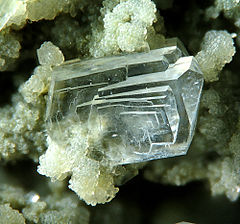Clinoptilolite
| Clinoptilolite | |
|---|---|

Clinoptilolite-Na
|
|
| General | |
| Category |
Tectosilicates Zeolites |
|
Formula (repeating unit) |
(Na,K,Ca)2-3Al3(Al,Si)2Si13O36·12H2O |
| Strunz classification | 9.GE.05 |
| Crystal system |
Monoclinic Unknown space group |
| Identification | |
| Mohs scale hardness | 3½ - 4 |
| Luster | Vitreous |
Clinoptilolite is a natural zeolite comprising a microporous arrangement of silica and alumina tetrahedra. It has the complex formula: (Na,K,Ca)2-3Al3(Al,Si)2Si13O36·12H2O. It forms as white to reddish tabular monoclinic tectosilicate crystals with a Mohs hardness of 3.5 to 4 and a specific gravity of 2.1 to 2.2. It commonly occurs as a devitrification product of volcanic glass shards in tuff and as vesicle fillings in basalts, andesites and rhyolites. It was described in 1969 from an occurrence in Owl Canyon, San Bernardino County, California.
It forms a series with heulandite:
Use of clinoptilolite in industry and academia focuses on its ion exchange properties having a strong exchange affinity for ammonium (NH4+). A typical example of this is in its use as an enzyme-based urea sensor. It is also used as fertiliser and sold as a deodorizer in the form of pebble-sized chunks contained in a mesh bag.
...
Wikipedia
